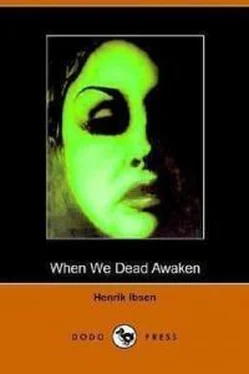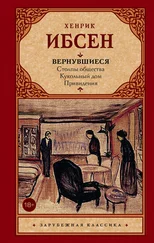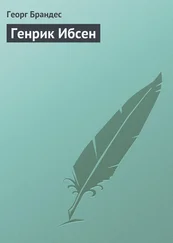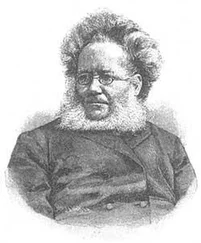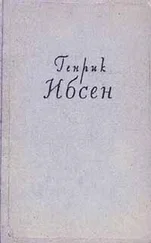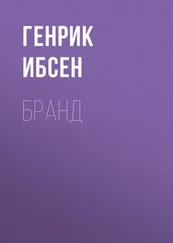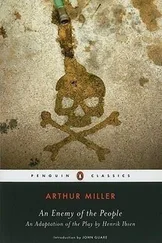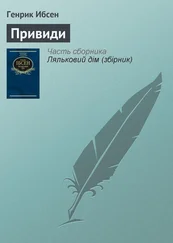IRENE.
[With apparent self–control.] I should have borne children in the world—many children—real children—not such children as are hidden away in grave–vaults. That was my vocation. I ought never to have served you—poet.
PROFESSOR RUBEK.
[Lost in recollection.] Yet those were beautiful days, Irene. Marvellously beautiful days—as I now look back upon them—
IRENE.
[Looking at him with a soft expression.] Can you remember a little word that you said—when you had finished—finished with me and with our child? [Nods to him.] Can you remember that little word, Arnold?
PROFESSOR RUBEK.
[Looks inquiringly at her.] Did I say a little word then, which you still remember?
IRENE.
Yes, you did. Can you not recall it?
PROFESSOR RUBEK.
[Shaking his head.] No, I can't say that I do. Not at the present moment, at any rate.
IRENE.
You took both my hands and pressed them warmly. And I stood there in breathless expectation. And then you said: "So now, Irene, I thank you from my heart. This," you said, "has been a priceless episode for me."
PROFESSOR RUBEK.
[Looks doubtfully at her.] Did I say "episode"? It is not a word I am in the habit of using.
IRENE.
You said "episode."
PROFESSOR RUBEK.
[With assumed cheerfulness.] Well, well—after all, it was in reality an episode.
IRENE.
[Curtly.] At that word I left you.
PROFESSOR RUBEK.
You take everything so painfully to heart, Irene.
IRENE.
[Drawing her hand over her forehead.] Perhaps you are right. Let us shake off all the hard things that go to the heart. [Plucks off the leaves of a mountain rose and strews them on the brook.] Look there, Arnold. There are our birds swimming.
PROFESSOR RUBEK.
What birds are they?
IRENE.
Can you not see? Of course they are flamingoes. Are they not rose–red?
PROFESSOR RUBEK.
Flamingoes do not swim. They only wade.
IRENE.
Then they are not flamingoes. They are sea–gulls.
PROFESSOR RUBEK.
They may be sea–gulls with red bills, yes. [Plucks broad green leaves and throws them into the brook.] Now I send out my ships after them.
IRENE.
But there must be no harpoon–men on board.
PROFESSOR RUBEK.
No, there shall be no harpoon–men. [Smiles to her.] Can you remember the summer when we used to sit like this outside the little peasant hut on the Lake of Taunitz?
IRENE.
[Nods.] On Saturday evenings, yes,—when we had finished our week's work—
PROFESSOR RUBEK. —And taken the train out to the lake—to stay there over Sunday—
IRENE.
[With an evil gleam of hatred in her eyes.] It was an episode, Arnold.
PROFESSOR RUBEK.
[As if not hearing.] Then, too, you used to set birds swimming in the brook. They were water–lilies which you—
IRENE.
They were white swans.
PROFESSOR RUBEK.
I meant swans, yes. And I remember that I fastened a great furry leaf to one of the swans. It looked like a burdock–leaf—
IRENE.
And then it turned into Lohengrin's boat—with the swan yoked to it.
PROFESSOR RUBEK.
How fond you were of that game, Irene.
IRENE.
We played it over and over again.
PROFESSOR RUBEK.
Every single Saturday, I believe,—all the summer through.
IRENE.
You said I was the swan that drew your boat.
PROFESSOR RUBEK.
Did I say so? Yes, I daresay I did. [Absorbed in the game.] Just see how the sea–gulls are swimming down the stream!
IRENE.
[Laughing.] And all your ships have run ashore.
PROFESSOR RUBEK.
[Throwing more leaves into the brook.] I have ships enough in reserve. [Follows the leaves with his eyes, throws more into the brook, and says after a pause.] Irene,—I have bought the little peasant hut beside the Lake of Taunitz.
IRENE.
Have you bought it? You often said you would, if you could afford it.
PROFESSOR RUBEK.
The day came when I could afford it easily enough; and so I bought it.
IRENE.
[With a sidelong look at him.] Then do you live out there now—in our old house?
PROFESSOR RUBEK.
No, I have had it pulled down long ago. And I have built myself a great, handsome, comfortable villa on the site—with a park around it. It is there that we— [Stops and corrects himself.] —there that I usually live during the summer.
IRENE.
[Mastering herself.] So you and—and the other one live out there now?
PROFESSOR RUBEK.
[With a touch of defiance.] Yes. When my wife and I are not travelling—as we are this year.
IRENE.
[Looking far before her.] Life was beautiful, beautiful by the Lake of Taunitz.
PROFESSOR RUBEK.
[As though looking back into himself.] And yet, Irene—
IRENE.
[Completing his thought.] —yet we two let slip all that life and its beauty.
PROFESSOR RUBEK.
[Softly, urgently.] Does repentance come too late, now?
IRENE.
[Does not answer, but sits silent for a moment; then she points over the upland.] Look there, Arnold,—now the sun is going down behind the peaks. See what a red glow the level rays cast over all the heathery knolls out yonder.
PROFESSOR RUBEK.
[Looks where she is pointing.] It is long since I have seen a sunset in the mountains.
IRENE.
Or a sunrise?
PROFESSOR RUBEK.
A sunrise I don't think I have ever seen.
IRENE.
[Smiles as though lost in recollection.] I once saw a marvellously lovely sunrise.
PROFESSOR RUBEK.
Did you? Where was that?
IRENE.
High, high up on a dizzy mountain–top.—You beguiled me up there by promising that I should see all the glory of the world if only I—
[She stops suddenly.
PROFESSOR RUBEK.
If only you—? Well?
IRENE.
I did as you told me—went with you up to the heights. And there I fell upon my knees and worshipped you, and served you. [Is silent for a moment; then says softly.] Then I saw the sunrise.
PROFESSOR RUBEK.
[Turning at him with a scornful smile.] With you—and the other woman?
PROFESSOR RUBEK.
[Urgently.] With me—as in our days of creation. You could open all that is locked up in me. Can you not find it in your heart, Irene?
IRENE.
[Shaking her head.] I have no longer the key to you, Arnold.
PROFESSOR RUBEK.
You have the key! You and you alone possess it! [Beseechingly.] Help me—that I may be able to live my life over again!
IRENE.
[Immovable as before.] Empty dreams! Idle—dead dreams. For the life you and I led there is no resurrection.
PROFESSOR RUBEK.
[Curtly, breaking off.] Then let us go on playing.
IRENE.
Yes, playing, playing—only playing!
[They sit and strew leaves and petals over the brook, where they float and sail away.
[Up the slope to the left at the back come ULFHEIM and MAIA in hunting costume. After them comes the SERVANT with the leash of dogs, with which he goes out to the right.
PROFESSOR RUBEK.
[Catching sight of them.] Ah! There is little Maia, going out with the bear–hunter.
IRENE.
Your lady, yes.
PROFESSOR RUBEK.
Or the other's.
MAIA.
[Looks around as she is crossing the upland, sees the two sitting by the brook, and calls out.] Good–night, Professor! Dream of me. Now I am going off on my adventures!
PROFESSOR RUBEK.
[Calls back to her.] What sort of an adventure is this to be?
MAIA.
[Approaching.] I am going to let life take the place of all the rest.
PROFESSOR RUBEK.
[Mockingly.] Aha! So you too are going to do that, little Maia?
MAIA.
Yes. And I've made a verse about it, and this is how it goes:
[Sings triumphantly.]
I am free! I am free! I am free!
Читать дальше
